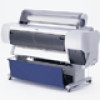Epson Stylus Pro 10600 - Photographic Dye Ink Printer Guide - Page 55
number 7
 |
View all Epson Stylus Pro 10600 - Photographic Dye Ink manuals
Add to My Manuals
Save this manual to your list of manuals |
Page 55 highlights
1-40 | Setting Up the Printer Note Ideally, number 8 (±1) should be the best line in all of the printed patterns. If it is, you can press Pause to exit the adjustment early. Note You'll get best results by performing the Uni-D adjustment first, then performing the Bi-D ALL adjustment. 8. Look at the other patterns across the same row to see if the same number is consistently the best line. If not, determine which number is generally the best. 9. Check the control panel display. It shows #1 C=8, which means that number 8 is the current setting for row #1 C. If you need to change the setting, use the + or - button to select the best line for that row. Then press the Enter button to register the setting. 10. Repeat step 7 through step 9 for each additional row. 11. When done, press the Pause button to exit the head alignment. If during the adjustment you had to select a line that was less than 7 or greater than 9, you should reprint the alignment pattern to verify that number 7, 8, or 9 is now the best line in each row. You may have to repeat the head alignment more than once to ensure that number 8 (±1) is the best choice in each case. 12. When done performing the adjustment in Uni-D (uni-directional) mode, as described above, you should repeat it in Bi-D mode (select ALIGNMENT = Bi-D ALL). The process is exactly the same, but the printed pattern is different: Number 8 is the best choice To select the best pattern, use an eye loupe to determine which block has the smallest gaps. In the example above, number 8 has the smallest gaps. Once this adjustment is done, you've finished setting up your Stylus Pro 10600. 1-40















